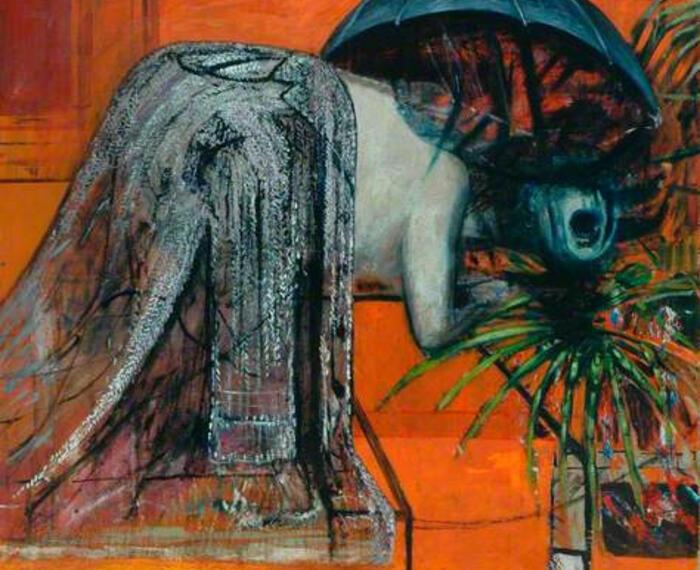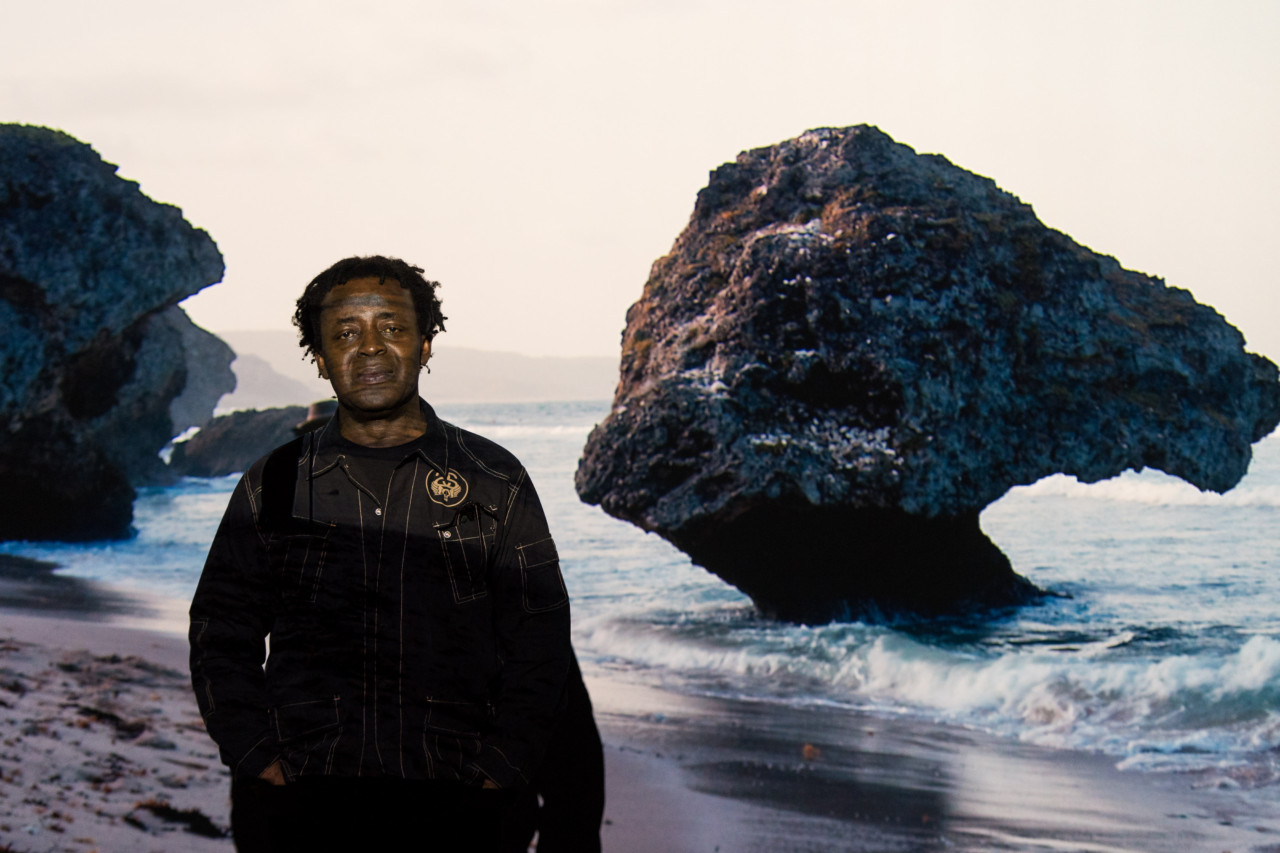


John Akomfrah with artwork Auto Da Fé. Photo by Polly Thomas
Last Thursday evening, John Akomfrah OBE was announced the winner of the £40,000 Artes Mundi Prize in Cardiff. The Ghanaian-born British filmmaker and co-founder of Black Audio Film Collective, needs no introduction here. His work Peripeteia (2012) was acquired from Frieze by the CAS Collections Fund and presented to Middlesbrough Institute of Modern Art last year.
The two-channel film work Akomfrah is showing at Artes Mundi is Auto da Fé (2016), an examination of religious persecution as a major cause of global displacement over 400 years. It begins with the little known 1654 flight of Sephardic Jews from Catholic Spain to Barbados. Akmofrah’s camera lingers over the Jewish graveyard there, the conceptual point of departure for this work.
Elegiac in tone, the work moves through the centuries, indicated by text captions and the details of the beautifully-produced costumes. Silent figures look out to sea with longing, arms raised in salute or prayer. They are set against historic buildings, empty or ruined, and crashing waves. The sumptuous quality of the film belies the dark stories being told.
The closing scenes bring us up to the present, with glimpsed figures in orange life jackets. A naked child’s doll and a checked plastic hold-all lie washed up on the beach. This imagery jars after the sublime landscapes and ravishing costume drama aesthetic that has been built up, bringing us back to the 5,000 people who lost their lives in the Mediterranean in 2016.
Akomfrah has been discussing migration in his work for decades, of course, but it is now an issue dominating the global agenda. He used his acceptance speech to denounce the bleak culture of fear and intolerance that has gripped the UK. The award was given in recognition of Akomfrah’s work over the last eight years, which includes his moving film Unfinished Conversation (2013) on Stuart Hall.
Founded in 2002, the biennial exhibition and prize Artes Mundi, is now in its seventh edition and it has done a remarkable job of getting respected international artists better known in the UK. It feels less competitive than the Turner Prize, more about creating a great exhibition. This year’s shortlist of six artists, selected from 700 nominations from 90 countries, explore social issues relating to the theme of ‘The Human Condition’.
The other British artist on this year’s shortlist, Bedwyr Williams, was also a winner. He received the Derek Williams Trust Purchase Award to acquire his work for £30,000 for the National Museum Wales collection. This felt fitting for one of Wales’ most loved artists and his work for Artes Mundi Tyrrau Maw (2016) was popular with both critics and audiences.
This video work, projected very large, is a digital rendering of a fantasy city in the Welsh mountains at Cadair Idris. As you watch it over its twenty-minute duration, the weather changes, clouds roll in, day becomes night and lights go on in the glossy apartment blocks, suggesting the presence of invisible inhabitants.
It is strangely mesmerising and relaxing to watch these gradual changes as you listen to Williams’ humorous narration of the city’s short history. He explores the bathos and the poetry of urban living from a God’s eye view through anecdotes of the designers and dwellers of its streets. It’s an interesting thought experiment. Could this be a post-Brexit future? Is this new city, built rapidly on a virgin site like somewhere in the Gulf or China, the result of an economic or ecological change? Cadair Idris is a mountain shrouded in mythology and it is said that if you spend the night there you either become a poet or run mad.
Lebanese artist Lamia Joreige also examines a city, but one with a long and turbulent history, her native Beirut. In Under-Writing Beirut, a series of videos and installations exhibited here, she takes two areas as focal points for forensic examination, as metaphors. Mathaf (2013), draws attention to the holes in the walls of the city’s museum used by snipers during the civil war – made even through priceless mosaics – and a list of irreplaceable objects missing from its stores. The other site is a dried-up river, in Nahr (2013-16). In these videos, she asks people to recount their memories and stories of the place and uncovers narratives of displacement from Syrians forced to flee their country and try to build a life in Beirut. Lebanon is a country about the same size as Wales and plays host to 1.5 million Syrian refugees, a number equivalent to a third of its population.
The two youngest artists in the show, Nástio Mosquito and Neïl Beloufa, take a playful attitude to the farce of contemporary politics. Neïl Beloufa, a French-Algerian artist nominated for the 2015 Prix Marcel Duchamp, is best known to UK audiences for his well-received solo show at ICA in 2014. In Cardiff, he shows a new installation incorporating his video World Domination (2012) that takes non-professional actors and invites them to play at ruling the world. He gives them the trappings of the UN – power suits, round tables and simultaneous translation – and sets them to discuss global problems such as poverty, immigration and terrorism. In our age of politics-by-twitter, the extreme views they expound should come as no surprise. Beloufa further complicates his work by projecting it onto a hand-crafted, bumpy screen that moves back and forth. Is he reminding us not to trust what we see on the screens we surround ourselves with during our every waking hour? The disruption is both frustrating and refreshing.
Angolan artist Nástio Mosquito made his debut on the UK art scene when his first solo show opened at IKON, Birmingham in 2015. Mosquito offers a humorous exploration of a despotic, corrupt leader, through a fictional character he inhabits: A.L. Moore, leader of Botrovia. In Transitory Suppository Acts #I-IV (2016) he sets up a room in Chapter as a ramshackle bar with plastic garden chairs, empty beer crates and a small screen screwed to the wall. On this we watch Moore rehearsing his campaign speech, sometimes whilst on the toilet. This mildly scatological joke expands in another room where an Aid package has landed by parachute. Inside, rather than parcels of dried food, are boxes of medicine vowing to cure our ills. They are suppositories, ones that promise to soothe, shrink, relieve pain, locate and awake God. ‘The cure is here’ announces the instruction leaflet in multiple languages, ‘spread the butt cheeks’. Anthea Hamilton’s large sculpture of a man doing just that was the abiding image from last year’s Turner Prize, so perhaps there’s something in the air? Is this the only response left to us?
As a coda to the fatal journeys arrived at in the final scenes of Akomfrah’s Auto da Fé, American nominees Amy Franceschini/ Futurefarmers are on a journey in the reverse direction, from Northern Europe to the Middle East in Flatbread Society: Seed Journey (2016-17). They are undertaking a sea voyage to repatriate ancient grains, genetic code of plants expressed in seeds, to the Middle East in an old sailing boat the Christiana. The voyage begun in Oslo and concludes in Istanbul, collecting grains along the way, to return them to their point of origin, the fertile crescent, in a form of reverse engineering that unravels their long and complex history.
This collection of seeds includes those preserved by heroic scientists at the Vavilov Institute during the Siege of Leningrad in 1941, who starved to death in order to save seed stocks for future generations. This voyage is a poetic and, I feel, optimistic gesture to remind us of how much give and take has existed throughout our communal history and how deeply we are intertwined as human beings. As well as uncovering hidden histories, this multifaceted project is also a call to arms for the nourishment of the commons. A manifesto has been painted onto the wall of the museum in Morse code ‘we don’t need a museum to conserve varieties of plant. What we need to do is to grow them.’
Artes Mundi is on until the 26 February. You can take in the exhibition across the two venues in a day trip but do stay over if you would like to take time to explore the National Museum Wales’s wonderful collection and catch a film at Chapter’s buzzing cinema.
Ali MacGilp
Programmes Manager
National Museum Cardiff, Cathays Park, Cardiff CF10 3NP. Open Tuesday – Sunday, 10.00-17.00.
Chapter Arts Centre, 40 Market Road, Cardiff CF5 1QE. Open Tue/Wed/Sat/Sun, 12.00-18.00 and Thu/Fri, 12.00-20.00.
Exhibition continues until Sunday 26 February 2017. www.artesmundi.org